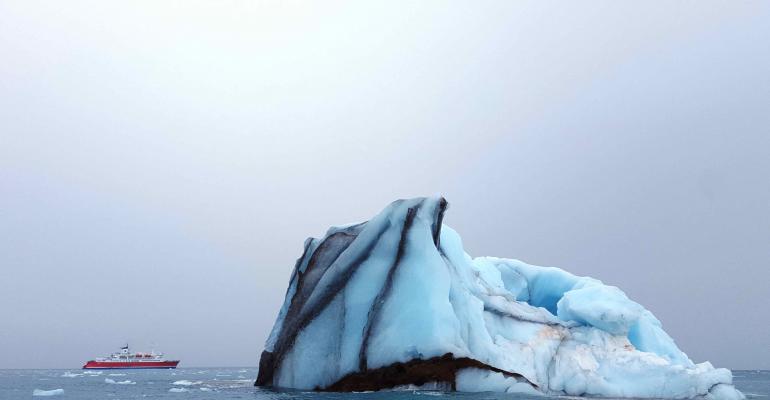AECO also cited the benefits of smaller ships in Svalbard but urged Norway to consult with stakeholders and consider the potential impacts of limiting vessel size on local businesses and communities dependent on tourism.
The association further welcomed additional measures to protect wildlife, nature and cultural heritage, which may include stricter rules about polar bear disturbance and landings in fragile areas. It pointed out that AECO members are required to follow many mandatory guidelines which non-members do not, and that ‘unorganized operators can represent an environmental and safety risk because they are held to lower operational standards.’
Response to Norwegian government's proposals
AECO’s comments are in response to a raft of measures for Svalbard’s protection that were put forward in a Dec. 9 news release by the Norwegian government.
‘As an industry association dedicated to managing responsible, environmentally friendly and safe tourism in the Arctic and striving to set the highest possible operating standards, AECO welcomes regulations that support this goal,’ the association said Monday. ‘AECO believes that an organized and well-managed travel industry is the best way to ensure that Arctic tourism is carried out with the utmost consideration for the vulnerable, natural environment, local cultures and cultural remains, as well as the challenging safety hazards at sea and on land.’
HFO ban
AECO has long supported a generalized ban on the use and carriage of HFO in Svalbard and the Arctic. The association was an early signatory of the Arctic Commitment which calls for a phase-out of HFO from Arctic shipping. Currently the association’s members refrain from using HFO when sailing in the Arctic, a practice formalized as a mandatory guideline when operating in the Arctic. This ban applies to all AECO members.
‘AECO represents the great majority of operators that offer expedition cruising in the Arctic,’ Executive Director Frigg Jørgensen said. ‘By formalizing this ban, the expedition cruise industry is sending a message to decision-makers that it is time to act to protect the Arctic from the risk of HFO pollution. We welcome the proposal from the Norwegian government to introduce a generalized ban on HFO) in Svalbard. We hope that other Arctic nations and the International Maritime Organization will follow Norway’s lead,’ she said.
Limiting ship size
Concerning a ship size limit, Jørgensen noted AECO members generally operate small and medium-sized vessels carrying up to 500 passengers, with the average passenger capacity ranging from 150 to 200 passengers.
‘We see many benefits of using relatively small vessels. The ships are less reliant on port infrastructure and are able to visit remote sites in a sustainable manner. Smaller passenger groups can also be more manageable for Arctic communities receiving them as visitors,’ Jørgensen said.
In addition, she cited a recent study from Svalbard showing that the expedition cruise vessels on average contribute 5.2 times more in local income per passenger compared to conventional cruise tourism.
From a search and rescue perspective smaller vessels may also be easier to manage.
So there may be benefits to smaller vessels, Jørgensen said. However, she added, ‘tourism is a major industry in Svalbard and the local community is depending on income from the cruise tourism in general. Before any regulations are enforced, the impact this may have on local business and communities should be researched, and local as well as industry stakeholders should be consulted.’
Site-specific guidelines
According to Norway’s press release, the government will consider additional measures to protect wildlife, nature and cultural heritage, which may include stricter rules about polar bear disturbance and landings in fragile areas.
AECO has developed mandatory guidelines and standards for its members above and beyond legal requirements. These includes guidelines for observing polar bears and other wildlife, biosecurity and operational guidelines dealing with safety and preparedness.
Site-specific guidelines also provide detailed instructions on how to carry out safe landings without disturbing local wildlife, natural features and cultural heritage. These have been made a legal requirement for visiting certain landing sites.
AECO supports making site-specific guidelines for ship landings a legal requirement in nine additional sites proposed by the government in the management plan for West-Spitsbergen national park.
The association said its experience from Svalbard shows that unorganized operators can represent an environmental and safety risk because they are held to lower operational standards.
Competence requirements
AECO requires staff working for its members to pass an online assessment about legal framework, guidelines and considerate visitor behavior. In addition, members must carry an observer to help ensure compliance with laws, guidelines and standards.
‘AECO believes that Svalbard would benefit if more operators were held to the same high standards as those that the expedition cruise industry has imposed on itself through the AECO guidelines' and would welcome measures related to competence requirements for guides, the association said.
Search and rescue
Search and rescue capacity may also be a concern related to larger vessels.
According to AECO, safety and marine preparedness are priorities for its members. Cross-sector dialogue can reduce risk and a contribute to a better joint understanding of capabilities and procedures and help both operators and search and rescue responders to develop best practices for coping with marine incidents.
Since its establishment in 2003, AECO has provided a forum for dialogue and collaboration between the industry, search and rescue entities and relevant authorities.
The association said passenger vessels can provide a very valuable asset in Arctic SAR operations since expedition cruise ships sail to remote areas during the summer season and often may be one of the nearest available resources if another vessel or even a local community experiences difficulty and needs assistance — sometimes long before SAR vessels can arrive.
Copyright © 2024. All rights reserved. Seatrade, a trading name of Informa Markets (UK) Limited.
Add Seatrade Cruise News to your Google News feed.  |

